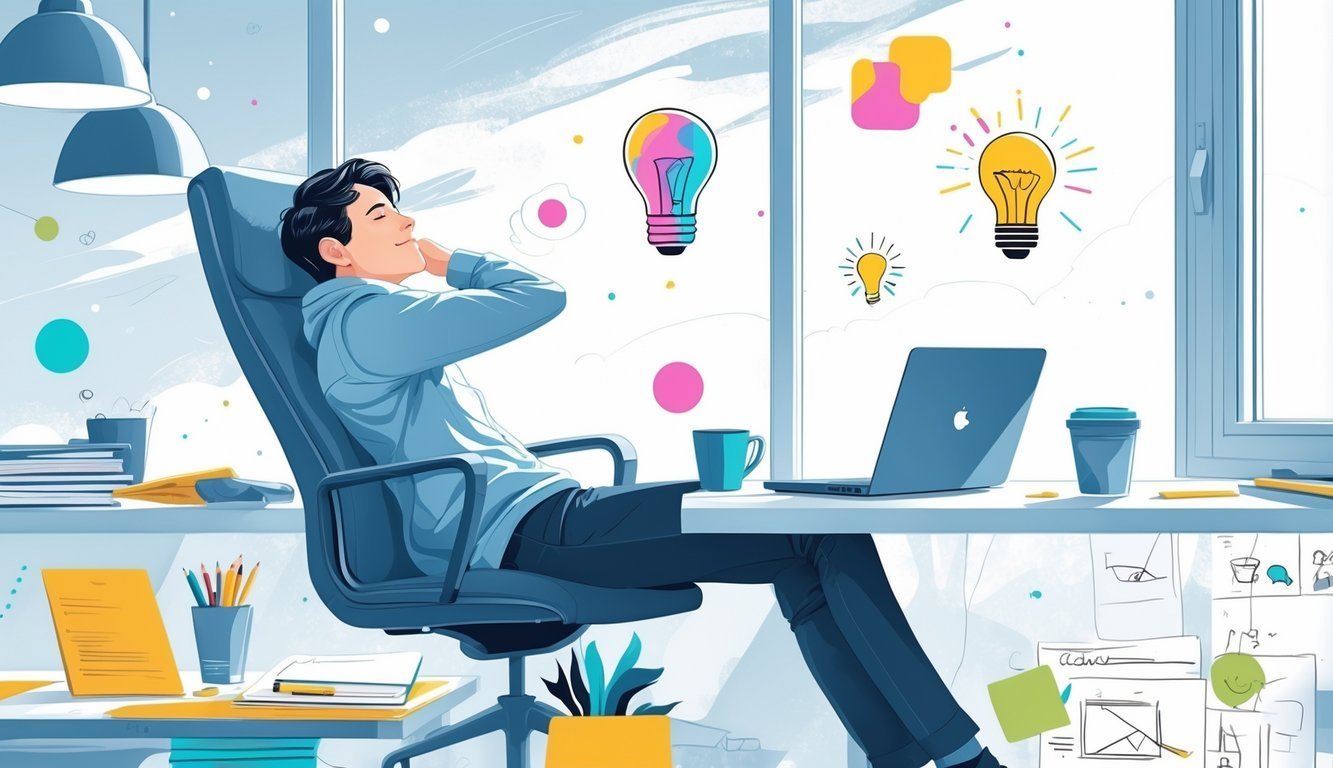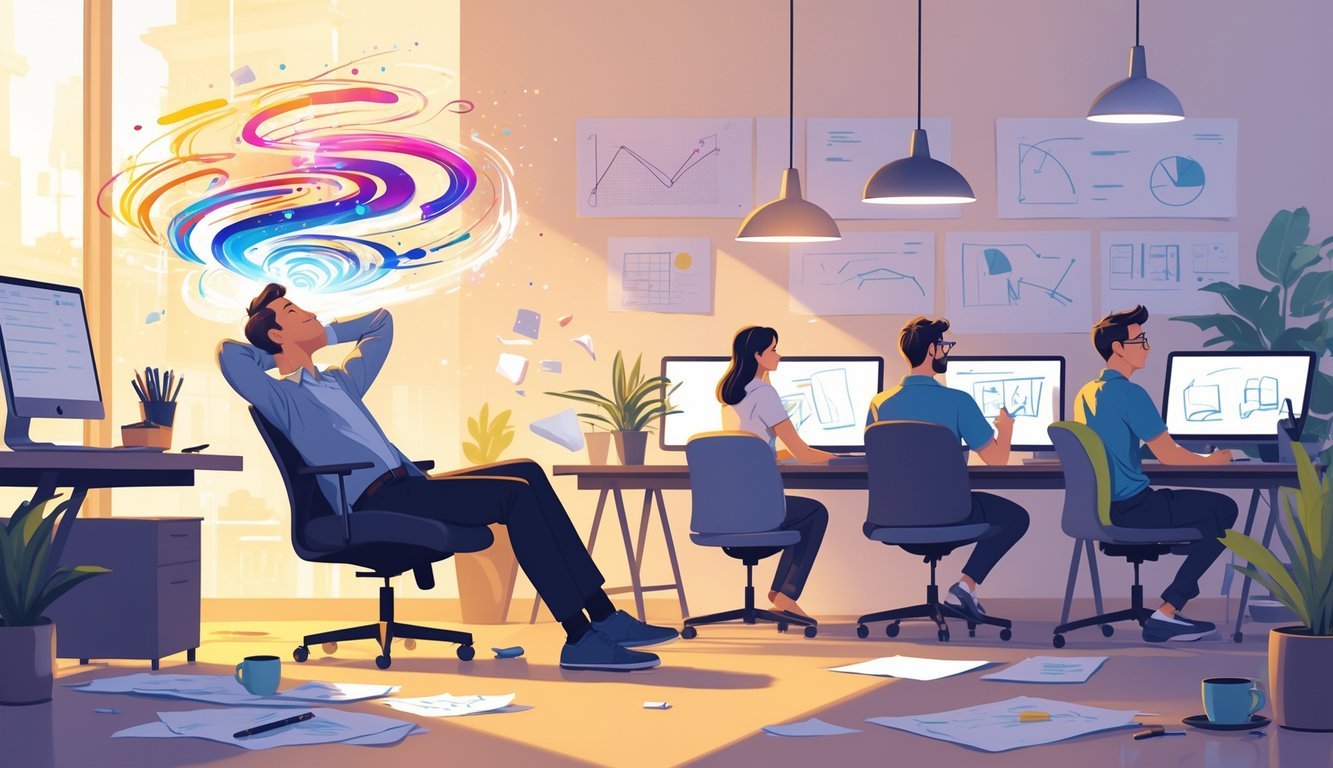PsychNewsDaily Publishers
100 Summit Drive
Burlington, MA, 01803
Telephone: (320) 349-2484
PsychNewsDaily Publishers
100 Summit Drive
Burlington, MA, 01803
Telephone: (320) 349-2484
Procrastination can enhance creativity by allowing the mind to incubate ideas, leading to innovative solutions and improved problem-solving when tasks are approached after a break.

People usually criticize procrastination at work, but honestly, it can help you come up with new ideas. If you take short breaks from tasks, your mind gets a chance to wander and connect thoughts in unexpected ways.
Delaying work for a bit can boost your creativity, especially when you’re motivated and allowed to think freely.
I’m not saying you should put off everything, but the right kind of procrastination can actually help your brain work better. When you step away, ideas have a chance to grow quietly before you jump back in.
If you manage it well, procrastination isn’t just about dodging work—it’s a way to let your creativity catch up. Sometimes, taking a step back helps you solve problems in ways you’d never find if you always rushed.
Instead of stressing about procrastination, maybe try seeing it as a tool for your creative side. Who knows? It might surprise you.

Sometimes, if you delay a task, your brain gets extra time to play with new ideas. When you wait, your mind can mix old knowledge with fresh thoughts.
This pause sometimes leads to better solutions and new ways to handle work problems. It’s kind of like letting your thoughts breathe.
When you procrastinate, your brain still works quietly in the background. This slower pace lets new ideas form without so much pressure.
Studies show that moderate procrastination gives your thoughts time to incubate and grow. You don’t want to put things off forever, though.
Too much delay can cause stress and crush creativity. But if you take a short break or wait a bit before starting, you often end up with more original ideas.
You might even rearrange problems in your head, spotting creative angles you missed before.
Jihae Shin at the University of Wisconsin has looked into how procrastination and creativity connect. Her research shows that if you have intrinsic motivation—so, you actually like your work—you’re more likely to use procrastination to boost creativity.
A study in the New York Times says that realistic deadlines help your brain incubate ideas. Adam Grant, a psychologist, also points out that short breaks and distractions can spark innovative thinking.
Procrastination works best when you have space to explore ideas without feeling squeezed by pressure.
Plenty of creative people have used procrastination to their advantage. Martin Luther King Jr., for example, stepped away from his work to let ideas grow, which helped him write powerful speeches.
Some top entrepreneurs in business say waiting and letting ideas mature led to better results. Their stories remind us that not rushing can lead to breakthroughs in brainstorming and building strong ideas.
So, maybe taking a pause is the secret ingredient for your next creative success.

You might assume putting off work always hurts productivity. But if you delay some tasks, you can actually come up with better ideas and more innovation—if you handle it right.
How you deal with instant rewards, balance your workflow, and handle stress really shapes your creative output at work.
At work, your urge for instant gratification sometimes clashes with your bigger goals. If you chase only quick wins, bigger projects can get left behind.
But if you manage that urge, you can use breaks and delays to recharge your mind. Short pauses—not just rushing—help your brain make new connections.
That pause can boost your ability to come up with fresh ideas. So, balancing quick wins with time for reflection can make you more productive and creative.
Not all procrastination feels the same. Structured procrastination means you put off one thing by working on something else useful.
This approach keeps you productive, especially if you use that time to gather ideas or solve little pieces of a problem. But chronic procrastinators avoid work too much.
They leave tasks unfinished, which tanks productivity and adds stress. If you get stuck, try breaking tasks into smaller steps.
Shifting your focus from avoiding work to making progress can help you turn procrastination into a tool.
Anxiety and perfectionism really affect how you procrastinate. If you’re nervous about doing something perfectly, you might not start at all.
That can freeze your progress and block creative ideas. But if you remind yourself nothing has to be perfect right away, you free yourself to begin sooner.
Letting go of perfection lets your creativity flow and reduces stress. Lowering anxiety can turn procrastination into a way to solve problems, instead of just adding pressure.

Procrastination can actually help your creativity because your mind gets time to work on ideas in the background. When you finally focus, you might find new ways of thinking and better ways to solve problems.
If you wait before starting a task, your brain keeps quietly processing ideas. That break lets different thoughts connect, which can lead to creative solutions.
Sometimes putting off work lets you explore new ideas. You might find better approaches or unique answers after stepping away from the task for a while.
Giving your mind space to think freely can help you come up with innovative ideas that set your work apart. That creative edge can boost your job performance and reputation.
Sometimes, the pressure of a deadline sharpens your focus. That stress can push you to think quickly and come up with fresh ideas you wouldn’t have found earlier.
Knowing a deadline is coming up can boost your drive to work efficiently. That sense of urgency can make your creative energy flow in quick bursts.
Deadlines push people to tune out distractions. When you have no choice but to focus, your mind tends to sharpen up.
This kind of pressure can actually make your creative work clearer and, oddly enough, better.